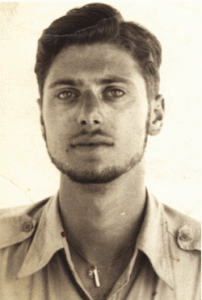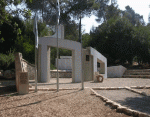The Machal memorial, in Jewish National Fund’s Yitzhak Rabin Park. (photo from machal.org.il)
You would think that, after serving in the Second World War, you would just want to pick up where you had left your civilian life. Indeed, the vast majority of Jewish and non-Jewish Canadian soldiers did so. But some 300 Canadian fighters joined more than 4,100 volunteers from almost 60 countries to fight for and maintain Israel’s independence. They were referred to as machalnikim, machal being an acronym in Hebrew for mitnadvei chutz l’Aretz, or “overseas volunteers.”
According to Smoky Simon, World Machal chair, four interrelated factors impelled the volunteers to keep fighting: the Holocaust, the British deportation of Holocaust survivors, the Arab threat to wipe out Palestine’s Jewish population and the feeling of Jewish unity, particularly in times of major crises.
These veteran fighters provided inexperienced Israeli forces with much-needed military knowledge and leadership. For example, Torontonian Ben Dunkelman claimed that “Canadian pilots accounted for one-third of all Arab planes shot down in that war.” In fact, John McElroy, a Canadian Second World War ace, succeeded in doing just that.
Following Israel’s independence, Machal volunteers built the radar system for the then-infant Israeli army. According to Rabbi Dr. Joe Heckelman, in his 1974 book American Volunteers and Israel’s War of Independence, this “early warning” system identified intruder planes “at relatively great distances.” Until mid-1949, a significant number of Machal personnel worked on the radar unit, then called Squadron 505.
Other Canadians volunteered for other kinds of service. Thus, Toronto-born Leonard Fine, who had served for five years as a physical training instructor in the Royal Canadian Air Force, joined the Israeli 72nd Infantry Battalion of the 7th Brigade. Dunkelman commanded this brigade. The only two platoons of the completely English-speaking B Company successfully removed problematic Arab Liberation Army observers and snipers situated on the Kabul mountains, overlooking the small Arab village of Tamra. Canadian volunteer Sidney Leisure died in the shooting. A month later, Fine became the sergeant major of the support company.
Another former member of the Canadian Air Force also switched military careers in Israel. Montreal-born Willie Rostoker volunteered to staff immigrant ships, undaunted by the fact that he had no sailing experience. Rostoker was quick to learn, and started studying navigation and other seaman’s skills. He proved to be a very good helmsman. Between 1946 and 1948, he worked on several Aliya Bet ships, including Ulua (aka Chaim Arlosorof), which docked in Palestine on Feb. 27, 1947; Pan York (aka Kibbutz Galuyot), which arrived in Palestine on Jan. 1, 1948; Fabio (aka the Battle of the Ayalon Valley), which made it to shore on May 29, 1948; and the Kefalos (aka the Southerner), which steered into Israel on Nov. 23, 1948. In addition, before the ma’apilim (Jews who tried to enter Palestine during the British blockade) set sail on the Battle of the Ayalon Valley, Rostoker trained them. When the fighting ended, he made Israel his home.
Speaking of ships, David Azrieli reports in Rekindling the Torch: The Story of Canadian Zionism (2008) that, during this period, two Canadian corvettes were purchased as “freighters” – the Beauharnois, renamed the Josiah Wedgwood, and the Norsyd, dubbed Aliya Bet Haganah. Canadian Moishe Sokolov volunteered to sail with the Haganah. It was supposed to transport 1,200 refugees and return for more people. But, once in Yugoslavia, the crew learned it would be the last Aliya Bet ship allowed into Palestine. Hence, orders were to take as many refugees as possible: 2,600 boarded, with about half below deck and half on deck. According to information obtained from the World Machal website: “It was so crowded that the ones above could not get below, and the ones below could not get topside. It was a very difficult and dangerous trip for all, passengers and crew alike, but all the refugees got to Palestine.”
After Israeli independence, the vessels were reactivated and renamed the Hashomer (Guard) and the Haganah (Defence). The vessels engaged Egyptian warships, bombarded enemy positions and patroled the shoreline. Their biggest coup came on Aug. 24, 1948, when the former Canadian corvettes seized a huge cargo of arms intended for the Arab armies. In what was called Operation Pirate’s Booty, the Hashomer and the Haganah intercepted the Argiro, a ship sailing under the Italian flag. The Israeli crew members found 8,000 rifles and 10 million rounds of ammunition.

Although not from a Zionist background, Canadian Joe Warner, now 90 (and going strong), joined the fighting because he felt “it won’t be worth being a Jew elsewhere if Israel did not survive.” He fought in southern Israel, in the Faluja area. The battles in which he participated helped free the Negev from Egyptian control of main roads. The combat – especially around the strong concrete police fortress of Iraq-Suidan – was intense. Years later, when Warner visited the Givati Museum established at that very spot, he found the captured Egyptian cannon his anti-tank unit had used.
Warner had been training as a pharmacist after his Second World War discharge. So, in Israel, he was called upon to be a pharmacist/ medic. He responded by setting up a first-aid station at Hazor, making use of medical equipment and supplies seized from the Egyptians. This early hands-on experience apparently served him well, as for 15 years he helped establish and manage Pfizer drugs in Israel.
In contrast to Warner, now 91-year-old Batya Wolfson Lam had a strong Zionist background. As a member of Toronto’s Shomer HaTzair, she had made aliya in 1947 or 1948. After three months of boring work on Kibbutz Sasa, she jumped at the call for volunteers to help in the fighting. She joined Machal, as the pay was slightly higher than the pay received by regular Israeli soldiers. She was assigned to the English-speaking air force codes and ciphers department. There, she received messages that she forwarded in secret code. She first worked at a station on Yarkon Street in Tel Aviv but, after a year, she opened stations in Jerusalem, Dorot, Yavniel and Haifa. She trained the staff for these locations. She served in the army for two years, returning briefly to Sasa. Then, she moved to Kibbutz Eindor, where she met her husband. Although her four children chose not to remain on the kibbutz, she has lived there for more than 70 years. She regrets that Machal volunteers haven’t received more recognition for their contribution to Israel.
Mention must be made of the Canadian volunteers who lost their lives in Israel’s fight for independence. They include both Jews and non-Jews. According to Heckelman and World Machal, they were George (Buzz) Beurling, Wilfred (Zev) Cantor, William (Willy) Fisher, Leonard (Len) Fitchett, Sidney Leizerowitz, Edward Lugech, Ralph Moster, Sidney Rubinoff, Reuben (Red) Schiff and Fred Stevenson. Two cousins, Harvey Cohen and Ed Lucatch, are not recorded to have joined any army unit; they disappeared without a trace.
Deborah Rubin Fields is an Israel-based features writer. She is also the author of Take a Peek Inside: A Child’s Guide to Radiology Exams, published in English, Hebrew and Arabic.


